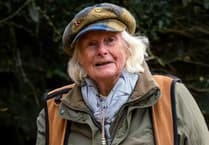LOCAL people, blasted into action by the intolerable nuisance of train horns, are at the end of their tether. Worn down by sleep deprivation and the constant abuse to their ear drums from four trains an hour sounding horns rated at 130 decibels every time they approach an unmanned crossing, the residents have had enough. They are not only calling for a radical reduction in noise level but they want a change in tone and a cut-off point at night. Some 80 residents met at a footpath crossing over the main Alton to Waterloo line at Isington last Friday to register their extreme concern over the impact of a recently enforced rule which means that new rolling stock has to sound its horn when approaching a footpath crossing no matter what time of day or night. The householders, who live along the line between Bentley Station and Alton, are angry over an approach by rail chiefs which appears to put the health and safety of crossing users above their own. While accepting that health and safety has to be taken into account, the feeling is that, unless on a bend, anyone crossing the line can see the train coming a long time in advance and that there is no point in sounding the horn at a rural footpath crossing after midnight because no-one is there. By contrast, harm is being inflicted on a daily basis on people living near the line, causing disruption to sleep and work patterns and in some cases manifesting itself in physical and/ or mental illness. One family told the story of a builder who was working on their house. When the train came past the first time and sounded its horn the man was so shocked he fell off his ladder. According to local campaign leader Barry Hope, there are four trains along the line every hour from 5-30 am to 1-30 am each day and they are obliged to sound their horns on the approach to at least four footpath crossings, two at Bentley Station, one at Isington and one further towards Alton. "These horns are rated at 130dB which exceeds the level at which permanent ear damage will occur, and is typically used for exceptional crisis alarms, which is way over the recognised safety level for unprotected ears," said Mr Hope. He added: "Local residents are reporting harm to their own and their children's health, and in some cases, serious impact on their working lives. The sound travels up to four miles away, so many people in the vicinity are reporting the effects of sleep deprivation akin to torture. They consider this an unacceptable and intolerable intrusion into their lives." According to Holybourne based acoustics expert Peter Whitmarsh, 130 dB is "far too loud" for a train horn and should be radically reduced both in terms of noise level and tone. He suggested a more appropriate way to alert people to an on-coming train would be to have a localised alarm system which would pick up the vibration and ring a bell which would be heard at the crossing and not radiate into the surrounding countryside. East Hampshire District Council environmental services manager Patricia Hughes said that because trains do not slow down for footpath crossings they are legally obliged to sound their horns up to 400m away to give people sufficient time to leave the crossing. The same is not true on a vehicular crossing because trains are required to slow down significantly. Mrs Hughes also advised that the legal minimum sound levels required to be used by rail operators had recently been reduced by 8dB, however the RSSB had no legal powers to enforce this ruling. On the local situation Mrs Hughes pointed out that Bentley, Binsted and Isington were not alone in their suffering. Other areas affected by train horn noise included Liss Forest and Buriton. She has asked HM Railway Inspectorate to investigate whether it would be possible to remove the whistle board at Isington which, she said, can be done where there are sight-lines over 400m in either direction. Residents at last Friday's protest meeting were unanimous in their condemnation of the noise level and questioned whether it was really necessary to continue on into the night. Mother of two Linda Winch said that the noise was "disrupting our lives". She said that while the horns on the old rolling stock were not as loud, since the introduction of the new Desiro trains in January, the noise had increased and was now "horrendous". Ken Barclay-Brown of Isington Close pointed out that it was illegal to sound a car horn in a built up area (unless in a legitimate emergency) before 7 am and after 11 pm at night. And, while he had been able to find evidence of cars running down people on pedestrian crossings he had been unable to unearth any evidence to support fears of pedestrian deaths on unmanned railway crossings. Local councillor Ken Carter said that Binsted Parish Council supported the concerns, recognising them as "a real problem" for local residents. He said that he had had a meeting with South West Trains (SWT) head of safety Mike Kirsley who had said that he would look into whether London bound trains stopping at Bentley Station needed to sound their horns on approach. Mr Kirsley had also given an assurance that the noise level of the horns would be reduced by a third to 112 dB, which should have been in place by the end of April. While a spokesperson for SWT confirmed that the company had been charged with reducing the noise level by about eight decibels (or 75 per cent) this was in 620 trains across the whole network and would take an estimated eight weeks to complete. She was unable to say when the Alton line trains would be tackled. She also confirmed that the problem of horn noise was a national issue. But, while the rules for horn sounding in tunnels had recently been relaxed it was still necessary to alert people to trains approaching unmanned crossings. She also explained that the horns in the new Desiro stock had been located under the train and that the noise was distributed sideways, making it louder. Having carried out tests the challenge was to reduce the noise level by approximately 75 per cent. "While we are going through this period of change SWT remains sympathetic to those people affected by the noise," she said. Alton Line Users' Association chairman Chris Campbell was supportive of the residents' plight and implored them to come to a meeting with SWT and Railtrack chiefs, to be held in Farnham on June 22.



